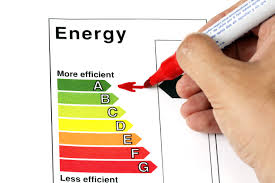Is your business ready for the Energy Audit Scheme?
 Does your organisation employ 250 employees or over (on payroll) or do you have an annual turnover in excess of €50m and an annual balance sheet total in excess of €43m?
Does your organisation employ 250 employees or over (on payroll) or do you have an annual turnover in excess of €50m and an annual balance sheet total in excess of €43m?
If your organisation meets any of the above criteria, then it is considered a ‘large organisation’ and you must complete an energy audit by 5th December 2015 under the EU Energy Efficiency Directive.
The EU Energy Efficiency Directive has been transposed into Irish Law as SI426. Under this legislation all large organisations are required to carry a ‘high quality energy audit’ every four years with the first such audit to be completed by 5th December this year. The Sustainable Energy Authority of Ireland (SEAI) has been tasked with the responsibility for setting up and operating the national audit scheme and this is referred to in Ireland as the “Energy Auditing Scheme”.
To demonstrate compliance, a business must use a Registered Energy Auditor to complete the audit and SEAI has developed a list of Registered Energy Auditors. Minimum criteria for energy audits have been set out:
- be based on up-to-date, measured, traceable operational data on energy consumption and (for electricity) load profiles;
- comprise a detailed review of the energy consumption profile of buildings or groups of buildings, industrial operations or installations, including transportation;
- build, whenever possible, on life-cycle cost analysis (LCCA) instead of Simple Payback Periods (SPP) in order to take account of long-term savings, residual values of long-term investments and discount rates;
- be proportionate, and sufficiently representative to permit the drawing of a reliable picture of overall energy performance and the reliable identification of the most significant opportunities for improvement.
Exemptions to the audit scheme do apply to accommodate companies that already have extensive energy analysis of their operations e.g. if you have a Greenhouse Gas Emissions Permit (ETS Participant), then your business is exempt, but you must be able to demonstrate, with evidence, that this is the case. If you have ISO 50001 certification or ISO 14001 certification, you may be eligible for a derogation, but there are a number of stipulations e.g. this must be certified by an independent body according to the relevant European or International standards and you must be able to demonstrate to SEAI that the management system concerned includes a specific and detailed energy audit element.
More detailed information on all aspects of the Energy Auditing Scheme is available on the SEAI website including a Guidance Note on the scheme and FAQs.
Is your business ready for the Energy Audit Scheme?
 Does your organisation employ 250 employees or over (on payroll) or do you have an annual turnover in excess of €50m and an annual balance sheet total in excess of €43m?
Does your organisation employ 250 employees or over (on payroll) or do you have an annual turnover in excess of €50m and an annual balance sheet total in excess of €43m?
If your organisation meets any of the above criteria, then it is considered a ‘large organisation’ and you must complete an energy audit by 5th December 2015 under the EU Energy Efficiency Directive.
The EU Energy Efficiency Directive has been transposed into Irish Law as SI426. Under this legislation all large organisations are required to carry a ‘high quality energy audit’ every four years with the first such audit to be completed by 5th December this year. The Sustainable Energy Authority of Ireland (SEAI) has been tasked with the responsibility for setting up and operating the national audit scheme and this is referred to in Ireland as the “Energy Auditing Scheme”.
To demonstrate compliance, a business must use a Registered Energy Auditor to complete the audit and SEAI has developed a list of Registered Energy Auditors. Minimum criteria for energy audits have been set out:
- be based on up-to-date, measured, traceable operational data on energy consumption and (for electricity) load profiles;
- comprise a detailed review of the energy consumption profile of buildings or groups of buildings, industrial operations or installations, including transportation;
- build, whenever possible, on life-cycle cost analysis (LCCA) instead of Simple Payback Periods (SPP) in order to take account of long-term savings, residual values of long-term investments and discount rates;
- be proportionate, and sufficiently representative to permit the drawing of a reliable picture of overall energy performance and the reliable identification of the most significant opportunities for improvement.
Exemptions to the audit scheme do apply to accommodate companies that already have extensive energy analysis of their operations e.g. if you have a Greenhouse Gas Emissions Permit (ETS Participant), then your business is exempt, but you must be able to demonstrate, with evidence, that this is the case. If you have ISO 50001 certification or ISO 14001 certification, you may be eligible for a derogation, but there are a number of stipulations e.g. this must be certified by an independent body according to the relevant European or International standards and you must be able to demonstrate to SEAI that the management system concerned includes a specific and detailed energy audit element.
More detailed information on all aspects of the Energy Auditing Scheme is available on the SEAI website including a Guidance Note on the scheme and FAQs.


